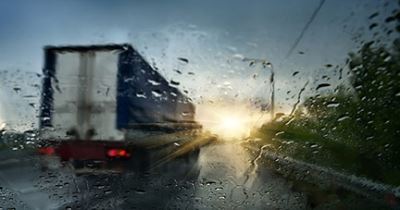Driving in wet conditions can cause hydroplaning, where a layer of water builds between the tires of the car and the road surface, resulting in a loss of traction that prevents the car from responding to control inputs. Hydroplaning can occur even when the road is slightly damp.
What Should You Do & Not Do When Your Car Hydroplanes
When the car hydroplanes, you should not immediately apply the brake. Braking without regaining traction causes the car to skid and lose control. If you are hydroplaning, ease off the accelerator, allow the car to decelerate enough to regain traction (once the wheels reconnect with the road surface), and then apply the brake smoothly.
How to recover from hydroplaning:
- Ease off accelerator
- Gradually decelerate
- Regain traction
- Apply brake nice and smooth
Big-Rigs, Trucks At Higher Risk of Hydroplaning
Driving safely during rain or snow is especially important for commercial drivers. The weight and center of gravity of a big rig or semi-truck play a part in controlling the vehicle while driving in extreme conditions. The center of gravity determines the safe speed for curves and turns. The higher the center of gravity, the higher the chance the vehicle will tip during a curve. If a driver takes a curve too fast, they can lose control. For instance, tires can lose traction and cause a skid. Under wet conditions, rigs are more likely to hydroplane decreasing their ability to steer or brake causing them to lose control.
Stay Safe in Wet Weather & Avoid Hydroplaning
Traction decreases on wet pavement whether or not hydroplaning occurs. All drivers should be careful to prevent their cars from hydroplaning.
How to prevent hydroplaning:
- Reduce your speed
- Proper tire pressure
- Unworn tires
- Rotate and balance tires
- Avoid standing water
- No cruise control on wet roadways
If you have been harmed by the negligent actions of a car or truck driver, contact a dedicated personal injury attorney at Kershaw Talley Barlow. Call us for a free case consultation at (916) 520-6639.


